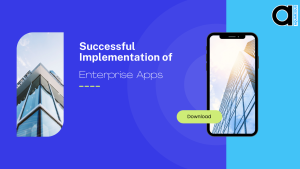Successful Implementation of Enterprise Apps

In the rapidly evolving digital landscape, enterprise applications have emerged as catalysts for business transformation. These sophisticated software solutions optimize processes, enable seamless collaboration, and empower businesses to thrive. The successful implementation of enterprise apps, however, demands a meticulous approach, strategic planning, and a deep understanding of organizational dynamics which the leading mobile app developer in Canada offers.
Choosing the Right App: A Strategic Imperative
Embarking on the journey of enterprise app implementation begins with a pivotal decision: selecting the most fitting app for the organization’s unique requirements. Whether it’s a customer relationship management (CRM) system to enhance client interactions or project management software to streamline operations, the chosen app should be aligned with the organization’s specific objectives and workflows.
Laying the Groundwork for Success: Planning Phase
Behind every triumphant app implementation lies a robust foundation and an expert mobile app developer in Canada. This phase involves setting crystal-clear project goals, meticulously defining the scope of work, and envisioning the desired outcomes. A comprehensive project plan, encompassing detailed timelines, resource allocation, and key responsibilities, serves as the guiding compass throughout the implementation journey.
Tailoring and Seamlessly Integrating the App
While selecting the right app is pivotal, tailoring it to meet the organization’s unique demands is equally crucial. Customization involves configuring the app to align with existing processes seamlessly. This personalized touch ensures that employees readily embrace the new technology, leading to enhanced adoption rates. Furthermore, integrating the app with the organization’s existing technological ecosystem fosters data fluidity and interoperability.
Testing, Refinement, and User-Centric Approach
The journey to successful implementation involves rigorous testing and quality assurance. This phase is akin to polishing a gem, as it entails identifying and rectifying any imperfections within the app’s functionality. Comprehensive testing encompasses both functional aspects and user experience, ensuring that the app operates flawlessly and intuitively. User acceptance testing provides valuable insights from end-users, refining the app to meet their needs effectively.
Empowering Users: Training and Onboarding
Introducing a new app to the workforce necessitates a robust training and onboarding strategy. Employees should be equipped with the knowledge and skills required to harness the app’s full potential. Structured training sessions, coupled with accessible resources and responsive support channels, create an environment where users can confidently embrace the app’s capabilities.
Nurturing Change and Effective Communication
Change management and communication are pivotal components of a successful implementation. Employees may encounter resistance to change, making it crucial to communicate the rationale and benefits of the new app. By fostering open channels of communication, addressing concerns, and highlighting the ways the app enhances productivity, organizations can pave the way for a smoother transition.
Continuous Enhancement: Monitoring and Iteration
Post-implementation, the journey continues with continuous monitoring and iterative enhancements. Regularly evaluating the app’s performance, identifying areas for improvement, and soliciting user feedback create a dynamic cycle of growth. This approach ensures that the app evolves alongside the organization’s changing needs, staying relevant and effective.
Measuring Success: Metrics and ROI
Key performance indicators (KPIs) are the compass that guides organizations to measure the success of app implementation. These quantifiable metrics offer insights into the app’s impact on operational efficiency, employee productivity, and overall business outcomes. Additionally, analyzing the return on investment (ROI) provides a tangible perspective on how the app contributes to the bottom line.
Overcoming Challenges: A Roadmap to Resilience
Navigating the complex terrain of enterprise app implementation is akin to embarking on a journey, where challenges are the inevitable twists and turns that test an organization’s mettle. The phase of “Overcoming Challenges” within this journey serves as a roadmap to resilience, offering a strategic approach to confront and conquer the hurdles that might arise. Challenges can manifest in various forms, from technical glitches to resistance from employees accustomed to established processes. However, these challenges need not be viewed as insurmountable roadblocks, but rather as opportunities to fortify the implementation process.
Identifying Challenges:
The first step in this roadmap involves a meticulous identification of potential challenges. This requires a thorough assessment of the organization’s existing systems, processes, and the specific nature of the app being implemented. By anticipating possible hurdles, organizations are better equipped to proactively develop strategies that address these challenges.
Crafting Targeted Strategies:
Each challenge demands a specific response. For instance, data migration challenges may necessitate a phased approach, ensuring data integrity and minimizing disruption. On the other hand, employee resistance might require a change management strategy that emphasizes clear communication and highlights the benefits of the new app. By tailoring strategies to each challenge, organizations can effectively mitigate risks and minimize negative impacts.
Flexibility and Adaptability:
The roadmap emphasizes the importance of flexibility and adaptability. Challenges are not static; they can evolve and present new dimensions as the implementation progresses. Organizations must be prepared to pivot their strategies, incorporating real-time feedback and insights. This approach fosters an agile mindset, allowing for quick adjustments that keep the implementation on track.
Learning from Experience:
Challenges are not merely obstacles but also valuable sources of learning. Each challenge provides insights into the organization’s dynamics, user behaviours, and the app’s integration with existing systems. You can leverage these insights to refine the implementation process, improving future app deployments and enhancing the organization’s overall adaptability.
Collaboration and Teamwork:
Overcoming challenges requires collective effort. The implementation team, comprising developers, project managers, and stakeholders, must collaborate closely to address challenges. Transparent communication, regular progress updates, and a shared commitment to overcoming obstacles are essential for success.
Innovation and Problem-Solving:
Often, challenges spark innovation. The roadmap encourages organizations to view challenges as opportunities to innovate and problem-solve. Whether it’s devising a novel workaround for technical glitches or exploring creative ways to engage employees in the new app, embracing challenges with an innovative spirit can lead to breakthrough solutions.
Celebrating Successes:
As you conquer challenges, you should celebrate mall victories. Acknowledging these accomplishments boosts team morale and reinforces the idea that challenges, no matter how formidable, can be surmounted with dedication and strategic thinking.
Envisioning the Future of App Implementation
As technology advances, the landscape of app implementation evolves in tandem. Emerging trends such as AI-driven automation, enhanced data analytics, and more intuitive user interfaces are poised to shape the future. Organizations that remain proactive in adopting these trends can stay ahead of the curve.
Conclusion: Empowering Transformation
In the grand tapestry of business evolution, enterprise app implementation holds a prominent thread. The successful integration of these powerful tools has the potential to reshape workflows, enhance collaboration, and drive innovation. By following a well-crafted roadmap, engaging stakeholders, and leveraging the lessons of both successes and challenges, organizations can set themselves on a trajectory toward transformational success.
Aquarious Technology, a mobile app developer in Canada, specializes in providing comprehensive solutions for developing cutting-edge enterprise apps that drive business growth and operational efficiency. With a deep understanding of diverse industries and technological trends, Aquarious Technology offers tailored app development services, from conceptualization to implementation. Their team of skilled developers, designers, and project managers collaborates closely with clients to create customized apps that seamlessly integrate with existing systems, streamline workflows, and enhance collaboration. By leveraging its expertise in user-centric design, advanced technologies, and thorough testing, Aquarious Technology ensures the delivery of robust, user-friendly enterprise apps that empower organizations to stay competitive in the dynamic digital landscape.
-
14
+Category
-
98
+Post
Top Categories
Popular Posts
- The Power of Prototyping in Software Development
- Version Control Best Practices for App Development
- Understanding Visual Hierarchy: A Guide to Effective Design
- Crafting Intuitive Navigation: A Guide to Seamless User Experience
- Choose Your Best Cloud Provider
- Making the Leap: Transitioning from Manual to Automated Software Testing
- Using GitHub- Advantages and Disadvantages
- E-commerce Product Photography on a Budget
- Tech Innovation in Developing Countries
- Smart Cities: How Technology is Shaping the Urban Landscape
- Principles of Composition: Creating Visual Harmony with Composition
- Exploring Cross-Platform App Development
- Why Regular Website Updates Matter
- Navigating Effective Facebook Audience Targeting
- Implementing Ads for Game Monetization
- Designing User-Centric Mental Health Apps: Enhancing Well-being in the Digital Age
- NFTs and Collectibles: Creating NFT App Solutions for Collectors and Enthusiasts
- Successful Implementation of Enterprise Apps
- Maximizing Business Impact with EQ
- Proven SMO Ads Optimization Tips (2023)






